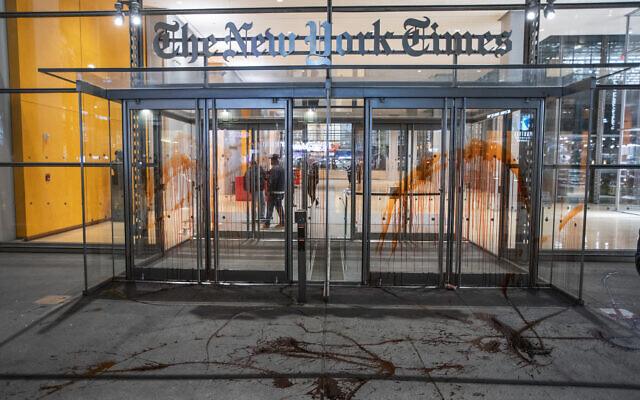New York Times, Reuters, author Thrall win Pulitzers for controversial Israel reporting
NYT wins for series of pieces on October 7 and Israel’s response, Reuters for Oct. 7 photography; Pulitzer Board issues citation for journalists, writers covering Israel-Hamas war

Pulitzer Prizes were awarded Monday to reports on the Israeli-Palestinian conflict that have become steeped in controversy since their publication, including breaking-news reporting and photography by The New York Times and Reuters of Hamas’s Oct. 7 massacre in southern Israel, and a nonfiction book by Jewish author Nathan Thrall.
The Pulitzer board also presented a special citation to journalists covering the war from Gaza, noting that “an extraordinary number have died” while doing so.
Staff at the Times won the Pulitzer for international reporting for a series of reports on the attacks in Israel and Israel’s subsequent campaign in Gaza, including work focusing on the intelligence failures of Israel’s security establishment, the ways in which the government had propped up Hamas for years, and IDF bombing of areas where it had instructed Gazan civilians to flee.
The Pulitzer jury did not cite “Screams Without Words,” a controversial Times report about rapes committed by Hamas on Oct. 7, in its comments. Published in December, the story has drawn criticism from pro-Palestinian media outlets that questioned the Times’ sources and from survivors and family members who said the paper’s characterization of what happened to people they knew was not true. The criticism led to a high-profile newsroom leak of internal debate over the piece and also has helped fuel some denials that Hamas committed rape during the attacks.
Reuters won in the breaking news photography category for its of-the-moment images of the beginning of the Oct. 7 attacks. Since the newswire published the images, it faced accusations from a pro-Israel media advocacy group that its photography staff had advance knowledge of the attacks, a charge the company has denied.
The Pulitzer jury did not mention the controversy in its citation, which praised Reuters for “raw and urgent photographs documenting the October 7th deadly attack in Israel by Hamas and the first weeks of Israel’s devastating assault on Gaza.”
Thrall, a Bard College professor based in Jerusalem whose work is often highly critical of Israel, won the Pulitzer for general nonfiction for his book “A Day in the Life of Abed Salama: Anatomy of a Jerusalem Tragedy.” Published days before Oct. 7, the book focuses on a Palestinian father’s efforts to uncover news about his son following a bus crash; the Pulitzer jury called it “a finely reported and intimate account of life under Israeli occupation of the West Bank.” The book also focuses on several Israeli characters whose lives intersect with Salama’s.
While Thrall’s book predates the Oct. 7 attack, his book tour was conducted in its shadow and has been a frequent magnet for controversy. Some tour stops canceled planned talks by Thrall, saying they would be “insensitive” in the midst of Israel’s war, in a sign of how the broader arts and culture landscape has been divided over Israel since the attacks. After the book’s publication, a local Jewish federation protested Thrall’s plan to teach a Bard course on whether Israel’s treatment of Palestinians could be considered apartheid.
At least one media outlet also canceled a planned sponsorship by his publisher, while Thrall himself turned down a speaking engagement at the University of Arkansas after the school, in accordance with state law, required him to sign a pledge promising not to boycott Israel. Thrall is currently in Berlin, where he said the Open Society Foundation, funded by progressive Jewish megadonor George Soros, paid to distribute free copies of his book.
Elsewhere in the awards, the Pulitzer committee honored Vladimir Kara-Murza, a Russian Jewish dissident, with the prize for commentary. Kara-Murza, who has accused Russia of committing war crimes in Ukraine, was sentenced to 25 years in prison last year for treason and won the Pulitzer from his cell.
Jewish author Jonathan Eig was also honored with the Pulitzer in biography for “King: A Life,” his thorough new biography of Martin Luther King, Jr., one of two books to receive the prize. Eig, who has also written a celebrated biography of Muhammad Ali, has said that his Judaism led him to explore topics related to African-Americans: “I’m Jewish and that also makes me feel like an outsider. Jewish people are often reminded that they share a history of oppression with African-Americans, which is one reason so many Jewish people were involved in the civil rights movement,” he told Chicago magazine in 2018.
“Here There Are Blueberries,” a play by Moisés Kaufman and Amanda Gronich that draws on real Nazi photographs of Auschwitz acquired by the U.S. Holocaust Memorial and Museum, was a finalist in the drama category but did not win. The show premiered at San Diego’s La Jolla Playhouse in 2022 and is currently playing at the New York Theatre Workshop. And in the memoir category, Jewish author Andrew Leland’s “The Country of the Blind: A Memoir at the End of Sight” was also a finalist.
The Pulitzers are overseen by the journalism school at Columbia University, which has been at the epicenter of a nationwide campus pro-Palestinian encampment movement and which canceled its university-wide commencement ceremony earlier on Monday in the wake of the protests.
The Pulitzer board met away from Columbia this past weekend to deliberate on its winners.
Several days before announcing the awards, the Pulitzer committee also issued a special acknowledgment of student journalists covering the campus protests.
Other winners
The Pulitzers’ prestigious award in public service went to ProPublica for reporting that “pierced the thick wall of secrecy” around the US Supreme Court to show how billionaires gave gifts and travel to justices.
The Pulitzers honored the best in journalism from 2023 in 15 categories, as well as eight arts categories focused on books, music, and theater. The public service winner receives a gold medal. All other winners receive $15,000.
The 15 photos in AP’s winning entry were taken across Latin America and along the US-Mexico border in Texas and California in a year when immigration was one of the world’s biggest stories. They were shot by AP staffers Greg Bull, Eric Gay, Fernando Llano, Marco Ugarte, and Eduardo Verdugo, and longtime AP freelancers Christian Chavez, Felix Marquez, and Ivan Valencia.
“These raw and emotional images came about through day-to-day coverage of a historic moment in multiple countries documenting migrants at every step of their treacherous journeys,” said Julie Pace, the AP’s senior vice president and executive editor.

The United States has seen more than 10 million border arrivals in the last five years, with migrants arriving from a wide range of new locations like Venezuela, Cuba, Ecuador, Haiti, and Africa, in contrast with earlier eras.
The AP has won 59 Pulitzer Prizes, including 36 for photography. The news cooperative was named a finalist for the national reporting Pulitzer on Monday for its coverage of hundreds of thousands of children who disappeared from public schools during the pandemic.
The Times’ Hannah Dreier won a Pulitzer for investigative reporting for her stories on migrant child labor across the United States. Contributing writer Katie Engelhart won the newspaper’s third Pulitzer, in feature writing, for her portrait of a family struggling with a matriarch’s dementia.

The Washington Post staff won in national reporting for its “sobering examination” of the AR-15 semi-automatic rifle, which came with some gut-wrenching photos.
The Post’s David E. Hoffman won in editorial writing for a “compelling and well-researched” series on how authoritarian regimes repress dissent in the digital age. Its third award went to contributor Vladimir Kara-Murza, for commentaries written from a Russian prison cell.
The Pulitzers gave a second award in national reporting to the Reuters staff for an “eye-opening” series that probed Elon Musk’s automobile and aerospace businesses.
The public service award honored ProPublica reporters Joshua Kaplan, Justin Elliott, Brett Murphy, Alex Mierjeski, and Kirsten Berg, whose stories prompted the Supreme Court to adopt its first code of conduct.
The Pulitzer board’s second special citation went to the late hip-hop critic Greg Tate.
To read more about the 2024 #Pulitzer winners and nominated finalists, click below.https://t.co/lh83to0Z7H
— The Pulitzer Prizes (@PulitzerPrizes) May 6, 2024
The New Yorker magazine won two Pulitzers. Sarah Stillman won in explanatory reporting for her report on the legal system’s reliance on felony murder charges. Contributor Medar de la Cruz won in illustrated reporting and commentary for his story humanizing inmates in the Rikers Island jail in New York City.
The staff of Lookout Santa Cruz in California won in the breaking news category for what the prize board called “nimble community-minded coverage” of flooding and mudslides.
In local reporting, Sarah Conway of City Bureau and Trina Reynolds-Tyler of the Invisible Institute won for an investigative series on missing Black girls and women in Chicago, which showed how racism and the police contributed to the problem.
The Pulitzer in criticism went to Justin Chang of The Los Angeles Times for evocative and genre-spanning coverage of movies.
For the first time, the Pulitzers opened eligibility to broadcast and audio companies that also operate digital news sites, such as CNN, NPR, and the broadcast networks ABC, CBS, and NBC. None of these companies won, however.
The Pulitzers also announced that five of the 45 finalists this year used artificial intelligence in research and reporting of their submissions. It was the first time the board required applicants for the award to disclose use of AI.
The prizes were established in the will of newspaper publisher Joseph Pulitzer and first awarded in 1917.










